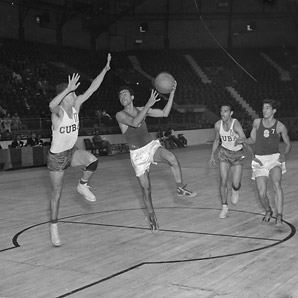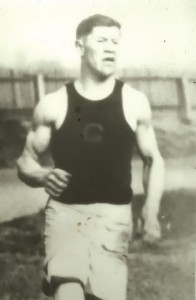OK, a couple weeks ago we reviewed all the new individual bests and records that were set in Sochi. Let’s look now at how the nations did in Sochi and has this affects the historical record.
First a word about national medal lists. The Europeans / Internationals and the Americans list their national medal lists differently. Internationally, the list leaders are those with the most gold medals, followed by silver medals, followed by bronze medals. In the United States and Canada, the list leaders are those with the most total medals, then sorting by gold, silver, and bronze. So when these differ we will try to mention that.
- Either way you look at it, Russia led the medal lists. They had the most medals, with 33, and the most gold medals, with 13. Norway was second with 11 gold medals, followed by Canada with 10, while the United States had the second most total medals, with 28.
- Going by gender, Russia led the men’s lists with 10 gold medals and 20 medals, followed by the Netherlands’ 14 medals and Norway’s 6 gold medals. The United States women had the most medals, with 13, followed by Norway with 12 and Canada with 11, but Canadian women won the most gold medals with 6, trailed by the United States and Norway, with 4 each. In mixed events, Russia was again pre-eminent in both systems, winning 5 medals and 2 gold medals. The United States, Germany, and Canada each won 2 mixed medals.
- In all, 26 nations won medals in Sochi, equalling the record set in 2006 and 2010. Oddly, no nations won a Winter Olympic medal for the first time in Sochi. And only Slovenia won their first Winter Olympic gold medals, with 2 won by Tina Maze in Alpine skiing. Had Slovenia not done that, Sochi would have been only the 3rd Winter Olympics at which no nation won their first Winter Olympic medal and no nation won their first Winter Olympic gold medal. That has only happened in 1960 at Squaw Valley and 1984 at Sarajevo.
- How did Russia’s 33 medals won in Sochi rank all-time? Well, here is the all-time list, showing that this was 4th best total medals ever won by one nation at one Winter Olympics:
[table]
Year,NOC,G,S,B,TM
2010,United States,9,15,13,37
2002,Germany,12,16,8,36
2002,United States,10,13,11,34
2014,Russia,13,11,9,33
2010,Germany,10,13,7,30
1988,Soviet Union,11,9,9,29
1998,Germany,12,9,8,29
2006,Germany,11,12,6,29
2014,United States,9,7,12,28
1976,Soviet Union,13,6,8,27
[/table]
- However, there were 98 events in Sochi, after only 86 events in Vancouver. And going way back, there were only 16 events at Chamonix in 1924 and 14 in 1928 and 1932. How does 33 medals rank all-time if we compare it to the number of possible medals won? Well, its not really close to the top if we look at medals won as a percentage of possible medals won. In fact, Russia won 12.6% of possible medals in Sochi, the lowest percentage ever by the leading medal-winning nation at a Winter Olympics. That list is dominated by the early Winter Olympics – fewer nations, fewer events, more chance to win a high percentage. Here is the list of the leading medal winning nations with the percentage of medals won:
[table]
Year,NOC,Medals,Possible,Events,%%%
1924,Norway,17,44,16,38.6%
1928,Norway,15,40,14,37.5%
1932,United States,12,40,14,30.0%
1936,Norway,15,47,17,31.9%
1948,Norway,10,62,22,16.1%
1948,Sweden,10,62,22,16.1%
1952,Norway,16,62,22,25.8%
1956,Soviet Union,16,66,24,24.2%
1960,Soviet Union,21,75,27,28.0%
1964,Soviet Union,25,96,34,26.0%
1968,Norway,14,99,35,14.1%
1972,Soviet Union,16,99,35,16.2%
1976,Soviet Union,27,105,37,25.7%
1980,German Demo. Rep.,23,108,38,21.3%
1984,Soviet Union,25,111,39,22.5%
1988,Soviet Union,29,128,46,22.7%
1992,Germany,26,159,57,16.4%
1994,Norway,26,171,61,15.2%
1998,Germany,29,186,68,15.6%
2002,Germany,36,216,78,16.7%
2006,Germany,29,226,84,12.8%
2010,United States,37,232,86,15.9%
2014,Russia,33,262,98,12.6%
[/table]
- Now we noted in a post on the last day of Sochi that Russia won 33 medals in 2014, after winning only 15 in 2010, an improvement of 18 medals. Was that a record? Nope. In 2002 the United States won 34 medals, after winning only 13 in 1998, an improvement of 21 medals. Note that both the USA in 2002 and Russia in 2014 did this on home soil. Also notable in 2014 was the improvement by the Netherlands, with 24 medals, after only 8 in Vancouver, an improvement of 16 medals, and the 3rd best NOC improvement ever from one Winter Olympics to the next.
[table]
Year,NOC,TM,Δ
1998,United States,13,
2002,United States,34,21
2010,Russia,15,
2014,Russia,33,18
2010,Netherlands,8,
2014,Netherlands,24,16
1988,Norway,5,
1992,Norway,20,15
2006,United States,25,
2010,United States,37,12
1972,Soviet Union,16,
1976,Soviet Union,27,11
1988,Austria,10,
1992,Austria,21,11
1984,Switzerland,5,
1988,Switzerland,15,10
[/table]
- If we look at it by sport, the leaders are as in the table below. Note that in 13 of the 15 sports / disciplines, the national leaders were the same in both systems. But in bobsledding and short-track speedskating, they were different.
[table]
Sport,RankUS,RankEU,NOC,G,S,B,TM
ASK,1,1,Austria,3,4,2,9
BIA,1,1,Norway,3,1,2,6
BOB,1,3,United States,-,1,3,4
BOB,2,1,Russia,2,-,-,2
CCS,1,1,Norway,5,2,4,11
CUR,1,1,Canada,2,-,-,2
FSK,1,1,Russia,3,1,1,5
FRS,1,1,Canada,4,4,1,9
ICH,1,1,Canada,2,-,-,2
LUG,1,1,Germany,4,1,-,5
NCO,1,1,Norway,2,1,1,4
STK,1,2,China,2,3,1,6
STK,2,1,Russia,3,1,1,5
SKE,1,1,Russia,1,-,1,2
SKJ,=1,=1,Germany,2,-,-,2
SKJ,=1,=1,Poland,2,-,-,2
SNB,1,1,United States,3,-,2,5
SSK,1,1,Netherlands,8,7,8,23
[/table]
- Most noteworthy, of course, is the Netherlands winning 23 medals in speed skating, of the 32 available to one nation (there are 12 events, but in team pursuit a nation can win only 1 medal). This is fully 71.9% of all available medals. How does this rank all-time? One needs to remember that there were 12 speed skating events in Sochi. If we look at single-sport performances by a nation all-time and limit it to sports in which there are 3 or more events at the Winter Olympics, we get the following for the best ever. You can see that the Netherlands ranks only 5th in this table.
[table]
Sport,Year,NOC,Medals,Possible,Events,%%%
LUG,1972,GDR,8,8,3,100.0%
CCS,1948,SWE,6,7,3,85.7%
CCS,1952,FIN,8,10,4,80.0%
LUG,1988,GDR,6,8,3,75.0%
SSK,2014,NED,23,32,12,71.9%
CCS,1936,SWE,5,7,3,71.4%
SKJ,1992,AUT,5,7,3,71.4%
CCS,1988,SOV,13,20,8,65.0%
LUG,1964,GER,5,8,3,62.5%
LUG,1976,GDR,5,8,3,62.5%
LUG,1998,GER,5,8,3,62.5%
LUG,2002,GER,5,8,3,62.5%
LUG,2010,GER,5,8,3,62.5%
[/table]
- But take a look at the number of events in that table – 3 or 4 in all cases except for the Soviet Union in 1988 cross-country skiing, which had 8 events. If we limit the search to national performances in Olympic year-sports with 8 or more events the Netherlands 2014 speed skating dominance was easily the greatest ever. Here is that table:
[table]
Sport,Year,NOC,Medals,Possible,Events,%%%
SSK,2014,NED,23,32,12,71.9%
CCS,1988,SOV,13,20,8,65.0%
SSK,1960,SOV,12,24,8,50.0%
SSK,1964,SOV,12,24,8,50.0%
ASK,2006,AUT,14,30,10,46.7%
SSK,1988,GDR,13,30,10,43.3%
BIA,2006,GER,11,26,10,42.3%
ASK,1988,SUI,11,30,10,36.7%
SSK,1992,GER,11,30,10,36.7%
ASK,1998,AUT,11,30,10,36.7%
SSK,1998,NED,11,30,10,36.7%
[/table]
- Otherwise, not too many surprises in the leaders by sports – Austria in Alpine skiing, Germany in luge, Canada in ice hockey, Norway in biathlon, cross-country and Nordic combined. Mostly what we have come to expect.
- But speaking of Germany, while we usually try to highlight the best and the brightest in these lists and posts, what happened to Deutschland in Sochi? They won only 19 medals in Sochi, after 30 in Vancouver, and were only 6th in the national medal list in Sochi, by either system. Since re-unification, here is how Germany has done at the Winter Olympics:
[table]
Year,NOC,G,S,B,TM,RankUS,RankEU
1992,Germany,10,10,6,26,1,1
1994,Germany,9,7,8,24,2,3
1998,Germany,12,9,8,29,1,1
2002,Germany,12,16,8,36,1,2
2006,Germany,11,12,6,29,1,1
2010,Germany,10,13,7,30,2,2
2014,Germany,8,6,5,19,6,6
[/table]
- So this was definitely the worst German performance at the Winter Olympics since the Berlin Wall fell. But why? They dominated in luge, as they always do. But the only other sport in which they topped the medals was ski jumping, and there are only 4 events in that sport. But look at 3 sports in which they normally win a lot of medals – biathlon, cross-country skiing, and speed skating. And remember, there were 35 events just in those 3 sports in 2014, with 91 possible medals to be won. Let’s look at those 3 sports and how they have done just since 2002:
[table]
Sport,Year,G,S,B,TM
Biathlon,2002,3,5,1,9
Biathlon,2006,5,4,2,11
Biathlon,2010,2,1,2,5
Biathlon,2014,-,2,-,2
Cross-Country Skiing,2002,1,2,2,5
Cross-Country Skiing,2006,-,3,1,4
Cross-Country Skiing,2010,1,4,-,5
Cross-Country Skiing,2014,-,-,1,1
Speedskating,2002,3,3,2,8
Speedskating,2006,1,1,1,3
Speedskating,2010,1,3,-,4
Speedskating,2014,-,-,-,0
Totals,2002,7,10,5,22
Totals,2006,6,8,4,18
Totals,2010,4,8,2,14
Totals,2014,-,2,1,3
[/table]
- So those 3 sports are almost entirely responsible for the fall-off in German performance in Sochi. In fact, looking at those 3 sports, while the drop-off in Sochi for Germany might have seemed precipitous, it was coming. As you can see Germany won 22 medals in BIA/CCS/SSK in Salt Lake City, 18 in Torino, and only 14 in Vancouver. There were signs that Germany’s overall performance in these sports was declining, but I think 0 speed skating medals was still somewhat surprising. In fact, if you give Germany the same 22 medals in these sports that they won in 2002, they would have won the following total medals since then: 2002 – 36; 2006 – 33; 2010 – 38; 2014 – 37. Almost no difference.

